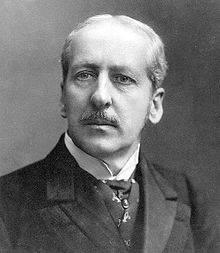William Pepper
William Pepper | |
|---|---|
 | |
| Born | August 21, 1843 |
| Died | July 28, 1898 (aged 54) |
| Nationality | American |
| Alma mater | University of Pennsylvania |
| Known for | Neuroblastoma |
| Scientific career | |
| Fields | Medicine |
| Signature | |
William Pepper Jr. (August 21, 1843 – July 28, 1898), was an American physician, leader in medical education in the nineteenth century, and a longtime Provost of the University of Pennsylvania.[1] In 1891, he founded the Free Library of Philadelphia.
Early life
Pepper was born in Philadelphia to Dr. William Pepper Sr. and Sarah Platt.[2] He married Frances Sergent Perry, a member of the Perry family naval dynasty on June 25, 1873. They were the parents of four sons (William, Thomas, Benjamin, and Oliver Pepper).[citation needed] He was educated at the University of Pennsylvania, graduating from the college in 1862 and from the medical school in 1864.[2]
Career
In 1868 Pepper became lecturer on morbid anatomy at the University of Pennsylvania School of Medicine and in 1870 lecturer on clinical medicine. From 1876 to 1887, he was professor of clinical medicine at Penn and in 1887 succeeded Dr Alfred Still as professor of theory and practice of medicine.[2]
Pepper founded the Philadelphia Medical Times and was editor of that journal in 1870 and 1871. He was elected provost of the University of Pennsylvania in 1881 and remained in that position until 1894. For his services as medical director of the United States Centennial Exhibition at Philadelphia in 1876, he was made Knight Commander of Saint Olaf by King Oscar II of Sweden.[2]
Pepper was the founder of Philadelphia's first free public library, chartered in 1891 through funds provided by the estate of his late uncle, which became the Free Library of Philadelphia, today the city's multi-branch public library system. He sponsored the Pepper-Hearst expedition (1895–1897) on the Gulf coast of Florida, near Tarpon Springs.[3]
Pepper was known academically for his contributions to the theory and practice of medicine and the System of Medicine that he edited in 1885-86 became one of America's standard medical textbooks. He died July 28, 1898, at Pleasanton, California.[2]
A bronze statue of Pepper by Karl Bitter stands on the south side of College Hall at the University of Pennsylvania. A replica of this stands on the landing of the main staircase of the Free Library of Philadelphia. In addition, a marble bust - also by Bitter - rests on a wooden base in the Edwin A. Fleisher Collection of Orchestral Music at the Free Library of Philadelphia.[citation needed]
Works
His contributions to the medical and scientific journals of the day included the following:[2]
- Trephining in Cerebral Disease (1871)
- Local Treatment in Pulmonary Cavities (1874)
- Catarrhal Irrigation (1881)
- Epilepsy (1883)
- Higher Medical Education: the True Interest of the Public and the Profession.
-
Dr. William Pepper by Karl Bitter (1896), University of Pennsylvania
-
Dr. William Pepper by Karl Bitter (1896, this casting 1899), Free Library of Philadelphia
-
Engraved portrait of Dr. William Pepper
References
- ^ Kelly, Howard A.; Burrage, Walter L. (eds.). . . Baltimore: The Norman, Remington Company.
- ^ a b c d e f One or more of the preceding sentences incorporates text from a publication now in the public domain: Chisholm, Hugh, ed. (1911). "Pepper, William". Encyclopædia Britannica. Vol. 21 (11th ed.). Cambridge University Press. p. 127.
- ^ Cushing, Frank Hamilton (1896). Preliminary Report on the Exploration of Ancient Key-dweller Remains on the Gulf Coast of Florida (Public domain ed.). MacCalla. p. 2.
Further reading
- Rothenberg, Alexis B; Berdon Walter E; D'Angio Giulio J; Yamashiro Darrell J; Cowles Robert A (February 2009). "Neuroblastoma-remembering the three physicians who described it a century ago: James Homer Wright, William Pepper, and Robert Hutchison". Pediatric Radiology. 39 (2). Germany: 155–60. doi:10.1007/s00247-008-1062-z. ISSN 0301-0449. PMID 19034443. S2CID 19611725.
- Lo Re, Vincent; Bellini Lisa M (August 2006). "William Pepper Jr, MD (1843-1898): portrait of a nineteenth-century medical educator". Journal of Medical Biography. 14 (3). England: 169–77. doi:10.1258/j.jmb.2006.05-26. ISSN 0967-7720. PMID 16845464. S2CID 19711366.
External links
- 1843 births
- 1898 deaths
- Physicians from Philadelphia
- Perelman School of Medicine at the University of Pennsylvania alumni
- 19th-century American physicians
- Chief Administrators of the University of Pennsylvania
- Members of the American Philosophical Society
- University of Pennsylvania alumni
- University of Pennsylvania faculty
- University of Pennsylvania Department of Biology faculty



